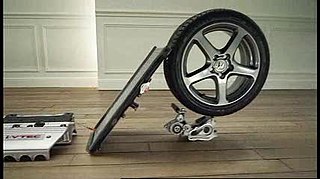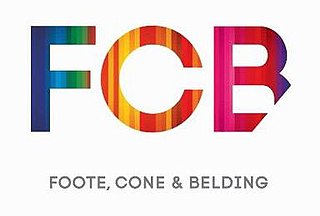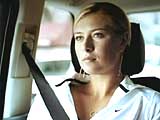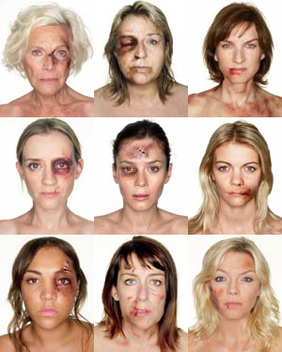
"Cog" is a British television and cinema advertisement launched by Honda in 2003 to promote the seventh-generation Accord line of cars. It follows the convention of a Rube Goldberg machine, utilizing a chain of colliding parts taken from a disassembled Accord. Wieden+Kennedy developed a £6 million marketing campaign around "Cog" and its partner pieces, "Sense" and "Everyday", broadcast later in the year. The piece itself was produced on a budget of £1 million by Partizan Midi-Minuit. Antoine Bardou-Jacquet directed the seven-month production, contracting The Mill to handle post-production. The 120-second final cut of "Cog" was broadcast on British television on 6 April 2003, during a commercial break in ITV's coverage of the 2003 Brazilian Grand Prix.

Keira Christina Knightley is an English actress. Known for her work in independent films and blockbusters, particularly period dramas, she has received numerous accolades, including nominations for two Academy Awards, two BAFTAs, three Golden Globes, and a Laurence Olivier Award. In 2018, she was appointed an OBE at Buckingham Palace for services to drama and charity.

ElizabethSwann is a fictional character in the Pirates of the Caribbean film series. She appears in The Curse of the Black Pearl (2003), Dead Man's Chest (2006), At World's End (2007) and Dead Men Tell No Tales (2017). She is portrayed by Keira Knightley in all four films. Elizabeth is the daughter of Weatherby Swann, the wife of Will Turner and the mother of Henry Turner.
Women's Aid Federation of England, commonly called Women's Aid within England, is one of a group of charities across the United Kingdom. There are four main Women's Aid Federations, 3 for each of the countries of the United Kingdom, and one for the Republic of Ireland. Its aim is to end domestic violence against women and children. The charity works at both local and national levels to ensure women's safety from domestic violence and promotes policies and practices to prevent domestic violence.
The Cannes Lions International Festival of Creativity is a global event for those working in creative communications, advertising, and related fields. It is considered the largest gathering of the advertising and creative communications industry.
Grey Group is a global advertising and marketing agency with headquarters in New York City, and 432 offices in 96 countries, operating in 154 cities. It is organized into four geographical units: North America; Europe, Middle East and Africa, Asia-Pacific, and Latin America.

Foote, Cone & Belding (FCB), is one of the largest global advertising agency networks. It is owned by Interpublic Group and was merged in 2006 with Draft Worldwide, adopting the name Draftfcb. In 2014 the company rebranded itself as FCB.

Evolution, also called The Evolution Of Beauty, is an advertising campaign launched by Unilever in 2006 as part of its Dove Campaign for Real Beauty, to promote the newly created Dove Self-Esteem Fund. The centre of the Unilever campaign is a 75-second spot produced by Ogilvy & Mather in Toronto, Ontario, Canada. The piece was first displayed online on 6 October 2006, and was later broadcast as a television and cinema spot in the Netherlands and the Middle East. The ad was created from the budget left over from the earlier Daughters campaign, and was intended to be the first in a series of such online-focused campaigns by the company. Later such videos include Onslaught and Amy.Evolution was directed by Canadian director Yael Staav and Tim Piper, with sound design handled by the Vapor Music Group, and post-production by SoHo.

The Duchess is a 2008 historical drama film directed by Saul Dibb, who co-wrote the screenplay with Jeffrey Hatcher and Anders Thomas Jensen, based on the 1998 book Georgiana, Duchess of Devonshire by Amanda Foreman, about the late 18th-century English aristocrat Georgiana Cavendish, Duchess of Devonshire. She was a distant relation of Diana, Princess of Wales, where the quote "There were three people in her marriage" in the promotional poster comes from. The Duchess was the older sister of Lady Diana's great-great-great-grandfather, George Spencer, 2nd Earl Spencer.
Breakthrough is a global human rights organization working to end violence against women and girls.

Pretty is a television advertisement launched in 2006 by Nike, Inc. to promote its "Nike Women" brand of sportswear. The 60-second spot was handled by advertising agency Wieden+Kennedy in Portland, Oregon. The advert stars Russian tennis player Maria Sharapova in her first appearance as a spokesperson for the brand. Pretty debuted on U.S. television on August 20, 2006, with later appearances in cinemas and in print advertisements. It was directed by Czech director Ivan Zachariáš, with post-production and VFX work by The Mill.

Carousel is an online advertisement launched in April 2009 by Philips to promote Philips Cinema 21:9 LCD televisions. The 139-second (2m19s) piece is a continuous tracking shot of a frozen moment after an armoured car heist gone wrong, with robbers dressed in clown masks holding a pitched battle with police officers inside a hospital. The campaign surrounding Carousel was led by the central Philips team at DDB in London and produced by advertising agency Tribal DDB in Amsterdam. It was directed by Adam Berg, with production contracted to London-based production company Stinkdigital. The ad went on to become a huge critical success, winning the advertising industry's most prestigious award: the Grand Prix at the Cannes Lions International Advertising Festival. It is only the second online advertisement to win in the Film category, after Dove's Evolution in 2007. Scenes from Carousel were used in the music video for hip hop artist 50 Cent's single "Ok, You're Right".
Mountain is a 2003 television and cinema advertisement launched by Sony Corporation to promote the PlayStation 2 video game console. The budget for production and advertising space purchases for the 60-second piece amounted to £5m across all markets. The commercial depicts a Brazilian crowd congregating to form a mountain of human bodies, all competing to reach the top of the pile. The campaign surrounding Mountain was handled by advertising agency TBWA London. The commercial was directed by Frank Budgen. Production was contracted to Gorgeous Enterprises, with post-production by The Mill. Mountain premiered in 30 countries on 13 November 2003.

Cake is a television and cinema advertisement launched in 2007 by Škoda Auto to promote the new second-generation Fabia supermini car in the United Kingdom. The 60-second spot forms the centrepiece of an integrated advertising campaign comprising appearances on television, in cinemas, in newspapers and magazines, online, and through direct marketing. The campaign and its component parts were handled by the London branch of advertising agency Fallon Worldwide. Cake was directed by British director Chris Palmer. Production was contracted to Gorgeous Enterprises, with sound handled by Wave Studios. It premiered on British television on 17 May 2007.

Bell Bajao is an anti-domestic violence campaign in India. It urges local residents to take a stand against physical abuse through acts meant to interrupt domestic violence. Residents, specifically men, are urged to "ring the doorbell" and ask a simple question when they overhear violence against a woman taking place, such as to borrow some tea, to use the phone, or to have a glass of water. This is meant to let the abuser know that others can hear them and will act to interrupt the violence.
Ivana Primorac is a Croatian make-up artist and hairstylist. She began her career working in television after a job working for the BBC. Primorac later moved on to working in feature films, including Atonement, Sweeney Todd, The Reader, and Barbie. Primorac has earned various awards and nominations for her work.

What's it going to take? is a British print and poster campaign launched in 2007 by Women's Aid to boost awareness of domestic violence against women in the United Kingdom. The campaign, handled by advertising agency Grey London, comprised photographs of nine female celebrities made-up to appear as though they were the victims of domestic abuse. The campaign received substantial media attention, with commentary appearing in The Daily Mail, This Morning, and Marie Claire, among others. The What's it going to take? campaign went on to win a number of honours within the advertising industry, including prizes at the 2008 Creative Circle Awards and the Aerial Awards.

The Life, also known as We Are ODST, is a television and cinema advertisement launched in 2009 by Microsoft to promote the first-person shooter Halo 3: ODST in the United States. The 150-second piece follows a young soldier through enlistment, training, and battle as an Orbital Drop Shock Trooper (ODST), analogous to a paratrooper that drops from space to a battlefield. The Life was created by advertising agency T.A.G., an offshoot of McCann Erickson. Production of the commercial itself was handled by production company Morton/Jankel/Zander (MJZ). It was directed by Rupert Sanders, and post-production was conducted by Asylum. It was filmed in Hungary, just outside Budapest in a coal mine and abandoned factories to give the sequence an "Eastern Bloc" aesthetic. The commercial and its associated campaign proved hugely successful; on the week of its launch, Halo 3: ODST became the top-selling game for the Xbox 360 worldwide, and over 2.5 million copies were sold within the first few weeks of release. The Life went on to win a number of honours from the advertising and entertainment industries, including two Clio Awards, a London International Advertising Award and several honours from the Cannes Lions International Advertising Festival, the most prestigious awards ceremony in the advertising industry.

Tag is a television and cinema advertisement launched by Nike Inc. in 2001 to promote its line of sportswear in the United States. It was one of four pieces forming the television component of the $25m "Play" campaign, which had been running for several months. Tag was created by advertising agency Wieden+Kennedy. Production was handled by production company Gorgeous Enterprises, who assigned director Frank Budgen to oversee the project. Filming took place in Toronto, Ontario.
"Champagne" was a television and cinema advertisement launched by Microsoft and created by Bartle Bogle Hegarty. Released in March 2002, the commercial aired in Europe to promote the European release for Xbox. However, after the advertisement received 136 complaints, the commercial was banned on 4 June 2002.














